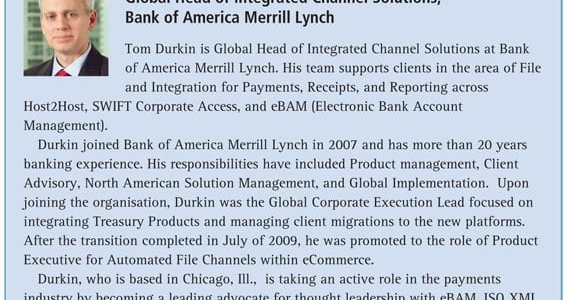by Tom Durkin, Global Head of Integrated Channel Solutions, Bank of America Merrill Lynch
Society for Worldwide Interbank Financial Telecommunication (SWIFT) adoption is a common goal for many multinationals given the efficiency and flexibility achieved through the standardisation of corporate-to-bank communication channels. However, as SWIFT Corporate Access becomes ubiquitous among the world’s largest companies – over 1,100 firms use the platform – it is becoming increasingly important to differentiate between banks’ provision of SWIFT services.
At first glance, the idea of distinguishing between banks’ SWIFT capabilities seems unnecessary: the key attraction of SWIFT – in addition to its robust security and reliability – is that it facilitates bank interoperability rather than proprietary linkages. However, SWIFT is about much more than just access to a technology pipeline to transmit Financial Message Type (FIN MT) communication between corporates and banks. Companies need to work with a bank that has the experience, expertise and value-added functionality that will help enable them to achieve their goals. These criteria should be paramount when corporates fine tune their banking relationship selection process.
The benefits of choosing a bank experienced in SWIFT Corporate Access are self-evident. While thousands of banks around the world can claim to be able to send and receive FIN MT messages, only a few banks have practical experience of SWIFT implementation. Of those corporations using SWIFT, most have been implemented by a handful of banks – for example, approximately one third of all corporates on SWIFT are integrated with Bank of America Merrill Lynch.
Consequently, only a few banks can claim the ability to address the potential challenges that may arise during implementation, which can be a complex process. Those banks that have completed a large number of implementations may have greater credibility as a trusted advisor or consultant and often achieve greater success in conducting smooth implementations. Laurie McCulley, Partner, Treasury Strategies states, “In our work helping clients implement SWIFT, we know the difference a bank that’s operationally ready for SWIFT can make. Operational readiness can mean everything from the basics of bank technology infrastructure that supports SWIFT reporting and message transmission to SWIFT for Corporates documentation, a sales team that knows how to answer corporate questions about SWIFT connectivity and a dedicated implementation team to expedite the process. Choosing a bank which has a devoted team for SWIFT helps companies recognise the benefits of SWIFT connectivity much more quickly.”
Sign up for free to read the full article
Register Login with LinkedInAlready have an account?
Login
Download our Free Treasury App for mobile and tablet to read articles – no log in required.
Download Version Download Version




















